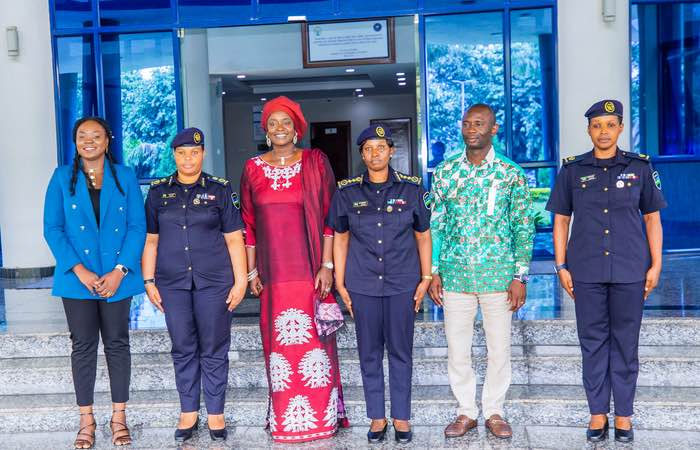
Kigali: A delegation from the Office of the Special Envoy on Women, Peace and Security of the African Union Commission, visited Rwanda National Police (RNP) on Friday, October 20.
Led by Ouriatou Danfakha, the Chief of Staff of the Special Envoy on Women, Peace and Security, the delegation was received at the RNP General Headquarters in Kacyiru, by the Deputy Inspector General of Police (DIGP) in charge of Administration and Personnel, Jeanne Chantal Ujeneza, who briefed them on the force’s role in planning and implementation of women participation in peace-building, peacekeeping, humanitarian response and post-conflict reconstruction.
“The Rwandan constitution provides the principle of equality of all Rwandans before the law as well as equality between women and men. This inclusive participation combines efforts of women and men to contribute to national security and development…understanding that when one is left out it affects the national transformation process to build a post-conflict Rwandan society,” said DIGP Ujeneza.
She elaborated on the RNP gender promotion and participation of female officers in peacebuilding and post-conflict reconstruction, including the establishment of gender-based violence desks, raising awareness on gender based violence, annual Police women convention to emphasize the aspect of gender equality, and participation of women in peacekeeping.
Today, women constitute 23 percent of the RNP total force and Rwanda, which started participating in peace support operations in 2005, is currently the leading contributor of female peacekeepers to UN missions.
Rwanda also maintains a female-dominated Formed Police Unit (FPU) contingent deployed under the UN Mission in South Sudan (UNMISS) and commanded by a female Police officer.
The UN Security Council Resolution 1325 on Women, Peace and Security reaffirms the important role of women in the prevention and resolution of conflicts, peace negotiations, peace-building, peacekeeping, humanitarian response and in post-conflict reconstruction and stresses the importance of their equal participation and full involvement in all efforts for the maintenance and promotion of peace and security.
Resolution 1325 urges all actors to increase the participation of women and incorporate gender perspectives in all U.N peace and security efforts. It also calls on all parties to conflict to take special measures to protect women and girls from gender-based violence, particularly rape and other forms of sexual abuse, in situations of armed conflict.
On her part, Danfakha said that Rwanda presents a good example to learn from.
“We came as the AU Commission to learn from Rwanda’s women, peace and security agenda and how this agenda is being implemented; to pick the good practices so that the issue of women, peace and security is considered throughout the continent,” Danfakha said.
She added: “So far, we have met with different stakeholders, including the Police, and we have seen first-hand, what Rwanda has done in terms of women empowerment and on the issue of women, peace and security.”
“Here in Police, we have seen how the political will has translated into specific actions; the participation of women in decision-making, how the Police is integrating the fight against GBV…how the centre of excellence is dealing with gender violence in Rwanda and across the region. We have seen the efforts, deliberate actions that are being taken to end violence against women and girls in Rwanda.” (End)
